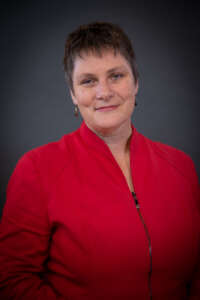More than 600 church pastors and leaders were present at Exponential Australia’s inaugural National Conference for the release of new research with good news and bad news for the Australian church.
Exponential Australia commissioned the research to be conducted by NCLS Research, which operates the largest and longest-running survey of local churches in the world, having tracked Australian church life and health for over 30 years.
The bad news

Dr Ruth Powell, director of NCLS Research
“The news is not good for churches whose response to major social change is to double down on what hasn’t been working for decades,” says Dr Ruth Powell, Director of NCLS Research. “Currently, seven in 10 local churches are declining, and there are signs that churches are turning inward.”
Exponential Conference attendees gathered for two days around the theme “igniting a culture of multiplication”, hearing from prominent international speakers like Pete Greig and Jon Tyson.
“Only 1 per cent of churches were planting a new church in Australia even before Covid in 2019.” – Tim O’Neill, director of Exponential Australia
Tim O’Neill, Director of Exponential Australia, recalls the “shocking news” Powell gave him earlier this year about the steep decline in Australian church planting over the five years up to December of 2021. “While this period included the pandemic,” he acknowledges, “it still sent me reeling … The number of churches experiencing growth had dropped, and the number of churches in decline had increased.”
Tim says Christians must face this “sobering” reality. “Only 1 per cent of churches were planting a new church in Australia even before Covid in 2019. That’s half the rate of planting previously.”
He estimates that 5 per cent of churches close each year, meaning the number of churches in Australia seems to be decreasing by 4 per cent each year. Tim laments this loss, convinced that Australia “needs more, not less, healthy churches that will take the good news and love of Jesus to people who don’t know him.” He emphasises the importance that “more men and women are raised up as workers for the harvest to plant more new churches”.
“Times are more than changing; they have changed.” – Tim O’Neill

Tim O’Neill, director of Exponential Australia
Tim points out that changing work conditions, generational change, financial pressures and new technologies make this “a time of volatility, uncertainty, complexity and ambiguity” not only for churches but for ministries, businesses and people around the country.
“The times are more than changing,” he concludes. “They have changed. And that means that we must be open to change too. If the church in our nation is not only to survive but thrive, we must seek out different ways of doing church and planting.”
“I love the church, and I have hope.” – Dr Ruth Powell, director of NCLS Research
The good news
The first piece of good news is that change in the church has already begun, with many new churches launched and an explosion of micro-church activity in recent years.
Tim implores the church to be prepared to put aside conventional wisdom or impotent practices, pointing to the teachings of Jesus and the “explosive church planting” in the book of Acts as models.
The Exponential Conference focused on six key factors for the Australian church to cultivate in pursuit of a renewed trajectory: audacious prayer, intentional discipleship, innovative church planting, empowering leadership and effective community engagement. Dr Powell provided research insights directly related to all six factors.
“I love the church, and I have hope,” she declared.

Attendees at the Exponential Conference
Another piece of good news, says Powell, is the state of Australia itself. “I have good news for anyone who wants to be part of God’s new thing,” she said. “Be encouraged that Australians remain spiritually aware and open.”
Her insights: two in 10 Australians describe themselves as atheist; a quarter pray at least weekly; more than half believe in God or a higher power and are open to spiritual experiences; nearly four in 10 say they will attend church if invited, with another 16 per cent unsure.
Discipleship must be more than “going deeper together”, she continues. “Jesus’ clear mission is to ‘go, make disciples’.”
New local churches are key to the future growth of the church.
A team effort
“Innovative church planting will require empowering leadership from local, denominational and network leaders. It has to be a team effort,” Powell says. “Be encouraged that new churches have more signs of health and vitality than older churches. And be encouraged that eight in 10 churchgoers will support something new.”
To nurture new churches, Exponential and NCLS Research have announced a collaborative initiative: the New Churches Project, a growing database for under-the-radar churches, designed to support investment in gatherings started since 2011.
Including church plants, new congregations or worship services, missional communities, micro-churches and simple churches, Exponential and NLCS Research believe new local churches are key to the future growth of the church. With a shared vision to work towards seeing the Australian church grow in strength, this partnership is a hopeful and practical step.
Click here to read NCLS Research’s new release, ‘Growth, Decline and Planting by Australian Churches: Results from the 2021 National Church Life Survey.’


